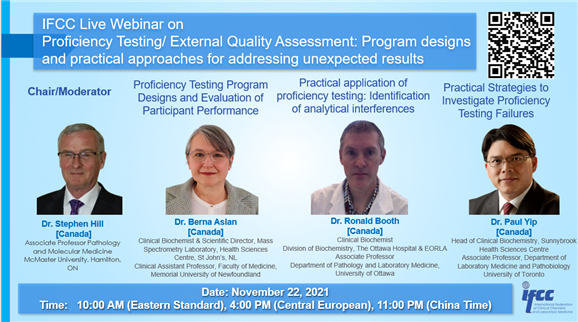
Dear Colleagues,
The next IFCC webinar: "Proficiency Testing/ External Quality Assessment: Program designs and practical approaches for addressing unexpected results" will be held on 22 November, 2021.
Although proficiency testing has been a well-established part of the laboratories quality assurance system for many years, maintaining successful performance can still be challenging. Due to the recent high staff turnover in medical laboratories, there is a continual need for training to interpret EQA results and address identified performance issues.
Proficiency Testing (PT) is a method that allows for the comparison of a laboratory's test results with an assigned value from an external source. Developing corrective and preventive actions requires understanding the program's design and using systematic root cause analysis techniques.
The IQMH Immunology proficiency testing program covers a broad array of immunology analytes, including protein electrophoresis. The proficiency material used is converted serum from a single patient to most closely representing true patient specimens. We routinely include material from patients with monoclonal gammopathies in our testing cycle, which at times can cause perceived erroneous results due to analytical interference.
Failures, also known as discordant findings, may indicate non-conformities to specified protocols and must be investigated to identify the root cause. Therefore, the process of investigating factors requires a systematic approach to all the inputs that ultimately produce a reported result. Quality improvement is achieved when problems in the system are corrected, and measures are taken to prevent the recurrence of the identified error. A thorough yet efficient approach is important for timely intervention especially when patient results may be affected.
- Schedule: 20 min per speaker plus 20 min panel discussion
- Time Zones: Live presentations starting at: 10:00AM EDT - 12:00PM Buenos Aires- AR; 4:00PM European Time; 8:30PM India; 11:00PM CST-Beijing
Important: Please ensure that you carefully determine the time that the presentation will start in your global time zone. Click here to convert to your time-zone. - Recorded webinar: available on demand
- Certificate of participation: available for all registrants
Register here